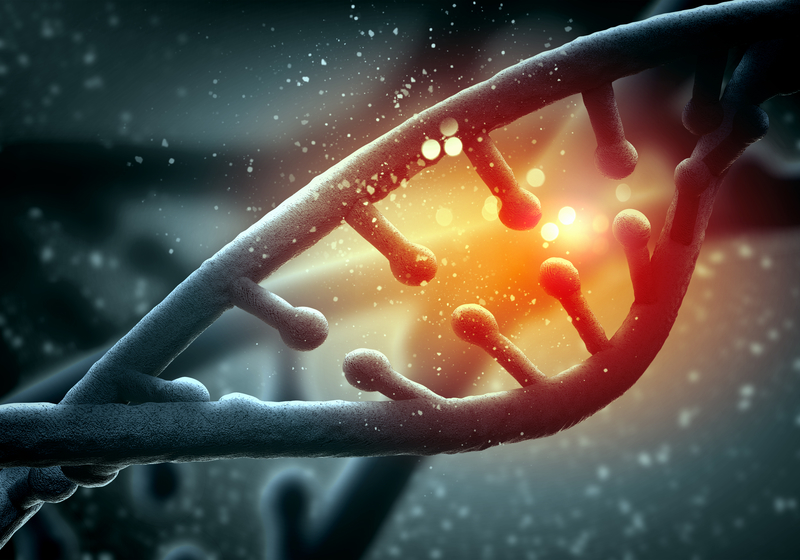Nutrigenomics: Is Your Best Diet Hiding in Your Genes?

Have you ever tried a diet that worked for a friend—or even a family member—that failed you miserably? Have you ever found certain foods, even foods typically regarded as very healthy, simply don’t agree with you? Do you ever find yourself picking your jaw up off the floor as your co-worker pours his fourth cup of coffee (especially when that just one cup makes you jittery and keeps you up half the night)? These differences—sometimes glaring, sometimes a little more intricate—can often be chalked up to nutrigenomics and nutrigenetics, which both fall under the umbrella of nutritional genomics.
What is nutrigenomics? What is nutrigenetics? What’s the difference? Why do they matter? And how do they apply to you? GREAT questions, and I’m glad you asked!
What is Nutrigenomics? What is Nutrigenetics?
According to scientists, nutrigenomics describes how diet can impact gene expression and stability.1 In other words, nutrigenomics is the study of how genes and nutrients interact. And it investigates how the foods we eat interact with our genes to affect our health. It’s key to emphasize that nutrigenomics uncovers the interaction of nutrients (and other bioactive compounds) on gene expression, which highlights the fact that certain genes can be turned on or off.
Therefore, nutrigenomics provides a genetic understanding for how common dietary components affect the balance between health and disease by altering the expression and/or structure of an individual’s genetic makeup.2 This gives rise to the beautiful summary provided by Teri Cochrane, Integrative Practitioner and leader in functional epigenetic nutrition: “Genes are our potential, not our destiny.” Another way to think about nutrigenomics is that it highlights the fact that food can influence how our genes behave.
It’s important to distinguish nutrigenomics from nutrigenetics, which is defined as the science of the effect of genetic variation on dietary response. Nutrigenetics describes that the genetic profile impacts the response of the body to bioactive food components by influencing their absorption, metabolism, and site of action. In other words, nutrigenetics aims to describe the role of inheritance on the metabolism and processing of nutrients.1–3 At the present, most of the well-studied nutritional genomics relationships are nutrigenetic.
In layman’s terms, nutrigenetics examines how your body responds to nutrients based on your genetics. Nutrigenomics, on the other hand, studies how nutrients affect your body’s expression of your genes. Despite the key differences, nutrigenetics and nutrigenomics are BOTH important, and they’re both critical to formulating a truly personalized nutrition program.
Nutrigenomics vs Nutrigenetics: A Breakdown
Nutrigenomics and nutrigenetics research can be summarized with the following five principles:2
- Diet (nutrients and other bioactive compounds) interacts with our genes, either directly or indirectly, to alter gene expression and/or structure.
- Under certain circumstances and in some individuals, diet can be a serious risk factor for a number of diseases. (On the flipside, diet can be a tremendous health asset, or as Hippocrates said, “Let food be thy medicine.”)
- Some diet-regulated genes are likely to play a role in the onset, incidence, progression, and/or severity of chronic diseases including cardiovascular disease, diabetes, cancer, cognitive decline, and obesity.4
- The degree to which diet influences the balance between healthy and disease states may depend on an individual’s genetic background.
- Dietary intervention (i.e., personalized nutrition) based on knowledge of individual nutrition requirements, nutritional status, and genotype can be used to prevent, relieve, or even cure chronic disease.
No “One-Size-Fits-All” Diet
In essence, the emergence of nutrigenomics and nutrigenetics has led to the concept of personalized nutrition, the “holy grail” of individualized dietary recommendations for optimal health.5 Personalized nutrition flies directly in the face of public health nutrition (such as the Dietary Guidelines for Americans), which attempts to provide one-size-fits-all dietary guidelines for the entire population. In other words, personalized nutrition helps put you in control instead of relying on (not-so-well-researched) generic standards set by governments.
In a broad sense, the concept of personalized nutrition isn’t really anything new. It is well-known—although arguably still underappreciated—that there is considerable variation in how individuals respond to the same food intake. However, with improving technology and advances in our understanding of genetics, nutrigenetics, and nutrigenomics, the concept of personalized nutrition has emerged. Personalized nutrition allows for dietary recommendations to take into account individual variation by tailoring to each person’s unique genetics.
Now, as exciting and promising as that sounds, there are many challenges in translating scientific advances into successful strategies for managing dietary intake and diet-related health outcomes on a large scale. These issues include:5
- Translation of (reductionist) research outcomes into practice
- Public perception and the likelihood of acceptance
- Issues of privacy and ethics
- Commercialization
- The level of evidence required before the transition from traditional approaches is beneficial
Nutrigenomics in Action
Of course, it has long been apparent that some people respond differently from others to certain foods. As mentioned above, most of the well-studied nutritional genomics relationships are nutrigenetic. And many nutrigenetic studies have focused on the interaction between common gene variants—mostly single nucleotide polymorphisms (or SNPs for short). Here are some common examples.
- Lactose intolerance. Generally speaking, folks with lactose intolerance experience GI discomfort (e.g., gas, cramping, bloating, flatulence, diarrhea) after consuming certain dairy products. Other individuals can consume dairy with no problems. Mutations in the lactase gene (LCT) appear to be responsible for lactose intolerance, as lactase is the enzyme responsible for breaking down milk sugar (lactose) into glucose and galactose in the small intestine.
It’s worth pointing out, however, that the perception of lactose intolerance is much higher than reality. In other words, the number of folks self-reporting lactose intolerance is considerably higher than the actual amount of people who don’t have the capacity to produce an adequate amount of lactase. In those cases, there may be something else at play (e.g., proteins). It’s important to point this out because more appropriate terminology may be “milk intolerance.”6,7
- Caffeine. Multiple studies, including a recent umbrella review of meta-analyses, have shown that regular coffee consumption is associated with reduced risk of mortality from cardiovascular disease.8 However, some studies have shown no effect or even an increased risk. While coffee is a rather complex beverage (with a number of bioactive compounds), it’s believed that the mixed findings may be due its caffeine content. For example, caffeinated coffee was found to increase the risk of heart attack among individuals who carry a version of a gene (CYP1A2) that makes them “slow” caffeine metabolizers. Yet it has no effect among individuals who are “fast” caffeine metabolizers.9 If you’re a “slow” metabolizer of caffeine, you’re more likely to feel the negative side effects (e.g., jittery, anxious, irritable, insomnia, high blood pressure). A “fast” metabolizer, on the other hand, is more likely to reap the benefits.
- Alcohol. A mutation in the alcohol dehydrogenase gene leads to a reduced ability to process alcohol and has been associated with addiction. An example of this is that alcohol affects Asians and Native Americans (who tend to carry this SNP) quite differently than Caucasians. Additionally, folks with a genetic predisposition toward fewer dopamine receptors (DRD2 A1) have a higher vulnerability to substance abuse.10
- Folate. Mutations in the MTHFR gene affect folate (one of the B vitamins) metabolism and are linked to increased risk for birth defects and chronic diseases including cardiovascular disease and cancer.11 Some estimates suggest that as much as 60% (or more) of the U.S. population carries a MTHFR mutation. This has tremendous significance because the synthetic form of folate (called folic acid) is found in many dietary supplements and in most fortified processed foods (e.g., bread, cereal). This is a huge problem because if you have a SNP in the MTHFR gene, it means you don’t have the enzymatic capacity to convert the inactive folic acid into its active form (methylfolate). This impairs the body’s ability to detoxify (i.e., methylation), leading to the accumulation of potentially toxic compounds (e.g., homocysteine) that can negatively impact brain health and function, cardiovascular health, mood, and more. What’s more, unmetabolized folic acid can have negative health consequences for pretty much everyone, regardless of genetics.
- Fat. Blood lipid responses to high- vs. low-fat diets differ between individuals, at least in part thanks to mutations in the APO family of genes. That’s why following current dietary guidelines (i.e., low fat) can lead to alterations in blood lipids in some people but not in others.5 It’s also why it may be a bad idea for some people to jump on the high-fat (keto) bandwagon.
- Carbs. Some folks are genetically inclined to produce a higher amount of the enzyme salivary amylase. This is an enzyme the body uses to breakdown starches (i.e., carbohydrates). Research has shown that people with more salivary amylase have a healthier blood glucose response (i.e., lower glycemic variability) after eating a starch-containing meal (e.g., potatoes, rice, etc.), an effect that may be due to a pronounced first-phase insulin response. On the other hand, people with low salivary amylase show poor glycemic control and may be at greater risk of insulin resistance.12 Speaking of glycemic responses, recent research also shows that people eating identical carb-containing meals show high degrees of inter-individual variability in their post-meal glycemic responses (see graphs below). In other words, glycemic variability is highly individualistic and meal-dependent—variations that seem to be rooted in both genetics and the diversity in the makeup of the gut microbiome.13 Along those lines, this is clear evidence that the glycemic index is an unreliable tool. So, it’s time to move toward personalized nutrition plans that take into consideration an individual’s glycemic responses.
In addition to those common examples above, it’s also important to point out that there are some unique bioactive food components that can favorably alter gene expression. Here are just a few examples:
- Sulforphane (broccoli)
- Curcumin (turmeric)
- Catechins (green tea)
- Resveratrol (grapes)
- Ellagic acid and anthocyanins (berries)
- Hydroxytyrosol and oleuropein (olives)
- Quercetin (onions)
Your Heritage is NOT Your Destiny
All this talk about genetics, and there’s no question that you may be feeling some mixed emotions. Maybe you’re feeling doomed. After all, you don’t feel like you were blessed with the most favorable genetic blueprint. On the other hand, maybe you’re feeling a sense of relief, and this is sort of an “Ah-ha!” moment that provides some insight into why you may experience some of the things you do, such as struggling with your weight.
The fact of the matter is that evolving field of nutrigenomics provides tremendous hope. You see, while genetic factors play a significant role (in obesity, for instance), heritability is not destiny.14 Environmental and lifestyle factors (and subsequent changes)—including diet—can play an enormous role in maintaining health and preventing disease. Along those lines, understanding the interaction of nutrition (and other environmental and lifestyle factors) with your genetic makeup is essential to optimizing every aspect of health (e.g., metabolic and cognitive health).
Epigenetic Influences
Nutrigenomics is transformational, as it holds enormous potential for optimizing human health, understanding individual variation, and ultimately, helping us construct truly personalized nutrition plans and diets. It’s important to point out, however, that diet is just one of many epigenetic influences which includes other environmental and lifestyle factors that can affect the expression of our genes.
That is, while our genes may be static, there are many environmental factors that can turn them “on” or “off.” You see, the literal meaning of the term epigenetic is “on top of or in addition to genetics.” What are some examples of other environmental factors (besides nutrition) that can drive epigenetic process?15
- Exercise
- Sleep
- Sun exposure
- Intermittent fasting and caloric restriction
- Social interactions
- Stress
- Financial status
- Microbiome
- Circadian rhythms
- Psychological state
- Where you live
- Heavy metals
- Pesticides, pollution, and toxins
- Tobacco smoke
- Hormones
- Radioactivity
- Viruses
- And more
I know that’s a long list. The one thing you need to appreciate is that your genetics do NOT equal destiny. Your environment and lifestyle can play a tremendous role in your capacity to live a long, robust life. In other words, healthy aging and longevity are influenced by a lucky combination of genetic and non-genetic factors. Better said, when it comes to optimizing health and longevity, it takes two to tango: genetics and lifestyle.16 In fact, family studies demonstrate that only about 25% of the variation in human longevity is due to genetic factors.
What is Nutrigenomics: Next Steps
Is your interest piqued? Are you ready to take some steps to find out what YOU should be doing next? First and foremost, tune into your body’s cues. Our bodies are constantly providing us feedback about our food choices and environment. Before dropping a ton of money on expensive testing, take an honest inventory of your behaviors and lifestyle choices. What do you notice when you eat certain foods? At certain times? In certain situations? How’s your sleep? Are you consistent with your exercise (but not overdoing it)? Are you getting outside enough? Are you spending quality time with people who bring you good energy? What’s your body telling you it needs? What’s your body telling you it doesn’t need?
- Wired to Eat by Robb Wolf is a phenomenal book that features practical tools and straightforward guidelines for creating your own personalized nutrition plan—a diet that’s not based on arbitrary food restriction but on the foods that work for YOU. What’s more, Robb also reveals that we are genetically wired to eat more and move less—the exact opposite of the advice we are often given.
- Dirty Genes by Dr. Ben Lynch is a master guide to discovering your personal “dirty genes,” which can be “born dirty” or merely “act dirty” in response to your environment, diet, or lifestyle. These can cause lifelong, life-threatening, and chronic health problems. Based on extensive research and experience, Dr. Lynch helps you clean up dirty genes with targeted plans, including personalized nutrition, good sleep, stress management, environmental detox, supplementation, and other holistic and natural means.
- The Personalized Diet by Professor Eran Segal and Dr. Eran Elinav of the Weizmann Institute of Science who also started The Personalized Nutrition Project, a large-scale nutrition initiative that aims to help people understand individual variation, construct truly personalized nutrition plans, and make food choices that are better for their health and well-being. (This was the same study I mentioned above showing the dramatic inter-individual glycemic variability.) This book gives readers the tools to create an individualized diet and lifestyle plan (based on their reactions to favorite foods) and puts them on the path to losing weight, feeling good, and preventing disease by eating in a way that’s right for them.
Of course, you can also get genetic testing done through a company like 23andMe. However, keep in mind that you are likely to be presented with an enormous, if not overwhelming, amount of information, which typically needs to be interpreted by an expert who can help make sense out of data and provide meaningful practical advice. For example, you could upload your genetic data to a service such as Dr. Lynch’s Strategene or DNAFit to get more personalized nutrition, exercise, and wellness advice.
If you’ve taken any of these steps, I’d love to hear from you. If you have questions, don’t be shy. Please share your experiences and questions in the comments below!







